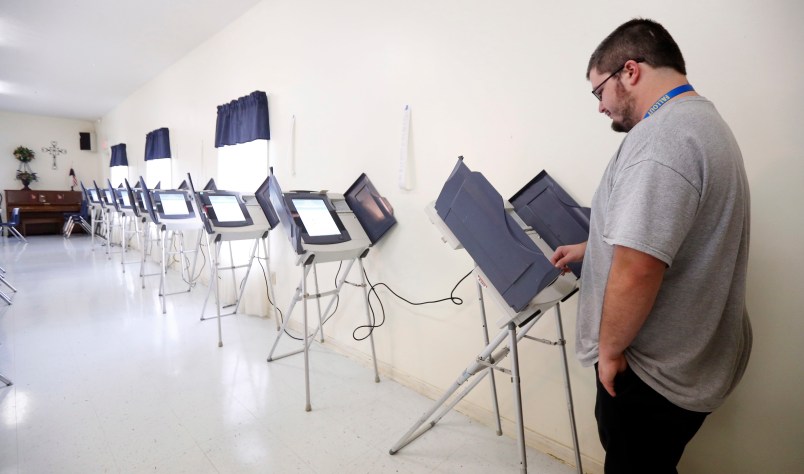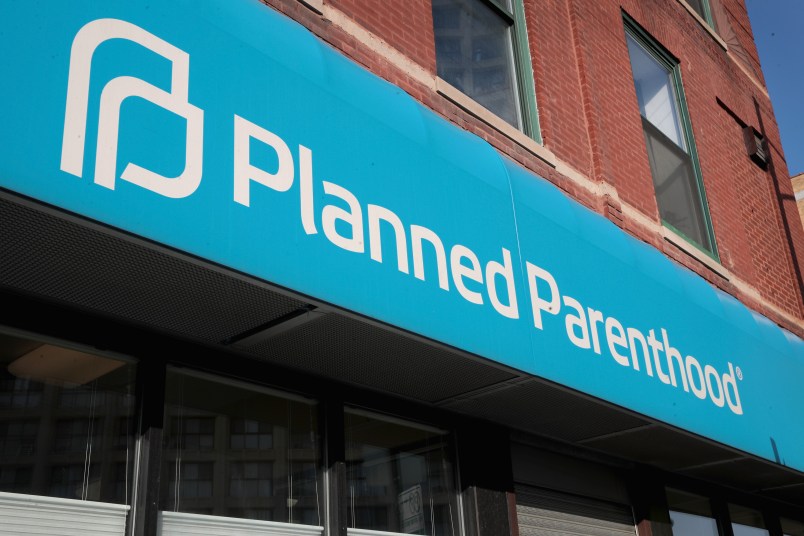WASHINGTON (AP) — Michigan was front and center Tuesday as voters in four states weighed in on the 2016 presidential race, testing Donald Trump’s staying power at the top of the Republican pack and Bernie Sanders’ narrowing chances to sideline Hillary Clinton’s march to the Democratic nomination.
___
HOW IT UNFOLDS
Polls close in Mississippi at 8 p.m., as they do in Michigan. But because there are a few counties in that state’s upper peninsula in the Central time zone, it will be 9 p.m. EST before voting ends there.
Both states will have exit poll data to poke through as they wait for results, helping to explain who voted for whom and why. Idaho’s Republican-only primary closes at 11 p.m., and Hawaii’s GOP caucuses close at 1 a.m. Results from Democrats living abroad also will filter in.
___
COUNTDOWN TO THE HALF
Going into Tuesday’s contests, Clinton was 58 delegates short of halfway to the 2,383 delegates needed to claim the Democratic prize. At stake Tuesday: 179 Democratic delegates.
Of more consequence is her more than 2-to-1 delegate lead over Sanders: 1,134 to 502.
Trump’s got a longer climb in the splintered GOP affair. He went into Tuesday with 384 delegates to 300 for Texas Sen. Cruz, 151 for Florida Sen. Marco Rubio and 37 for Ohio Gov. John Kasich.
Trump or any resurgent rival need a total of 619 to slip past the halfway mark, and 1,237 to clinch the nomination.
___
2 TWISTS
Clinton’s lead is cushioned by her lopsided advantage with the party insiders known as superdelegates, who can support anyone. They can change their mind before the convention, though that is unlikely to happen short of a meltdown of the Clinton campaign.
(Minus the superdelegates, she has a smaller lead over Sanders, 673-477, in delegates won through primaries and caucuses.)
Republicans will soon turn to a series of winner-take-all contests, and that’s where the numbers can change in a hurry. Two big states, Florida and Ohio, vote next week, and each will give all their delegates to the winner.
All GOP contests so far have been proportional, divvying up delegates among the contenders (with some extra allocation rules added to make it really complicated). All Democratic contests through the nomination race are proportional.
___
THE ANTI-TRUMPS
Cruz, the conservative firebrand, has put up the toughest fight against Trump, staying within range in the delegate hunt and aiming to become the last challenger standing against the billionaire if Rubio and Kasich can’t win their home states March 15.
With the Michigan primary, the race came to Kasich’s region. Rubio also campaigned in the state and hoped to show enough strength to give him something to brag about headed into Florida. He’s been the mainstream Republican hope in recent weeks, but has only won two contests in 20: Minnesota and Puerto Rico.
___
MICHIGAN (59 GOP delegates, 130 Democratic delegates)
Michigan, as well as Missouri next week, should offer clues about whether Sanders is making any progress in expanding his base of support beyond his devoted followers in the under-30 crowd, and making any progress with black voters, who have overwhelmingly favored Clinton. His time is getting short to catch Clinton in the delegate chase and he must broaden his appeal to do so.
In the last Democratic debate, in Flint, Michigan, Clinton hit Sanders hard for opposing a 2009 bill that provided billions to rescue the auto industry. The Vermont senator is stressing that he opposed the provision because it was part of a large bailout package for Wall Street. He said he supported an earlier, separate bill to aid the carmakers.
Should Trump win the GOP nomination, his path to the presidency could be through the Rust Belt. Michigan offers a window into the industrial Midwest as Trump reaches out for the economically disaffected and the angry with a message that has engaged Republican voters more broadly than the party and his rivals expected.
___
MISSISSIPPI (40 GOP delegates, 36 Democratic delegates)
Rubio didn’t campaign in the state; the other Republicans did. Neither Clinton nor Sanders made it there.
Clinton was favored on the Democratic side. Trump has scored well in Southern states despite the appeal of Cruz’s conservatism.
The 2016 race split the family of Medgar Evers, the Mississippi NAACP leader and voting-rights advocate who was murdered in 1963. His widow, Myrlie Evers-Williams, backed Clinton while his brother Charles, a longtime Republican, backed Trump.
___
IDAHO (32 GOP delegates)
Rubio and Cruz made quick campaign stops over the weekend and both have received notable endorsements, as has Kasich. Billionaire Frank VanderSloot, a GOP mega-donor, backs Rubio. Rep. Raul Labrador endorsed Cruz. Gov. C.L. “Butch” Otter said he’d only support a governor, so Kasich is his man.
___
HAWAII (19 GOP delegates)
None of the Republican candidates made the long trip to campaign for the small delegate prize in Hawaii’s GOP caucuses. But the Trump-centered debate raging on the mainland played out on the islands, too.
“If candidates are looking to win over the state, then I think they need to be a little bit more open to diversity and a little more centrist about their approach,” Beth Fukumoto-Chang, Republican leader in the state House, said recently.
Nathan Paikai, a minister who led Trump’s campaign efforts in Hawaii, differed with that opinion. “There’s many people out there who say, ‘I don’t like the way he talks,” Paikai said. “My response is, if it’s a soft tone and it’s a lie, do you believe it? What does it matter about tone?”
___
Associated Press writers Emily Wagster Pettus in Jackson, Mississippi, Kimberlee Kruesi in Boise, Idaho, David Eggert in Lansing, Michigan, and Cathy Bussewitz in Honolulu contributed to this report.
Copyright 2016 The Associated Press. All rights reserved. This material may not be published, broadcast, rewritten or redistributed.







